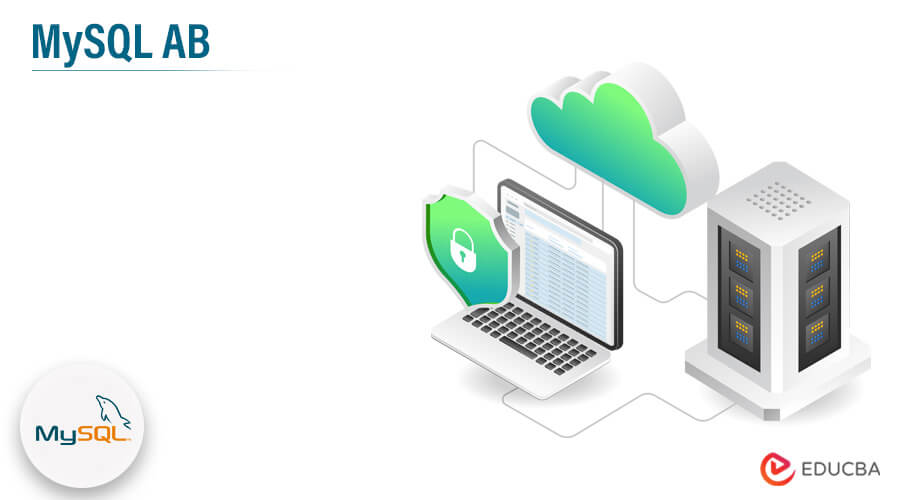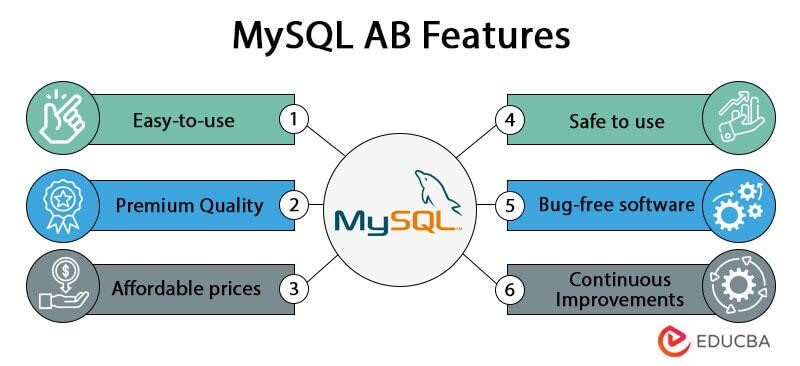Updated July 17, 2023
Introduction to MySQL AB
MySQL AB is a Swedish software-based company founded in the year of 1995. The AB part of the company came from the Swedish word ‘aktiebolag,’ which means stock company. It developed MySQL, an open-source database management system that stores data in rows, columns, and tables. The company’s founders are David Axmark, Allan Larsson, and Michael “Monty” Widenius. It is also a founder of related products like MySQL Clusters. Eventually, Sun Microsystems acquired MySQL AB in 2008. MySQL allows its users to insert, update and delete the data and write a query to perform some of the operations on the data.
Key Highlights
- MySQL AB is a Swedish software company founded in 1995 by David Axmark, Allan Larsson, and Michael “Monty” Widenius.
- The part AB in MySQL AB came from the Swedish word ‘aktiebolag,’ which means a stock company.
- It releases MySQL under General Public Licenses, meaning anyone can use the software for free.
- The company also provides certification courses by attending, which can enhance performance, security, and user experience.
MySQL AB Features
- Easy-to-use: MySQL is easy to learn. Moreover, MySQL AB provides training and certifications for the same.
- Premium Quality: MySQL is one of the most popular and widely used database management systems used in the world.
- Affordable Prices: MySQL is free for all under a GPL license.
- Safe to Use: MySQL allows the protection of sensitive data via encryption.
- Bug-free Software: A large community of open-source developers actively maintains MySQL, swiftly resolving bugs and errors.
- Regular Updates: There are continuous improvements to upgrade the software by adding new features or improving upon existing features.
MySQL AB Model and Services
- The company actively maintains its profile since its inception, utilizing the revenue it generates to improve user experience by making the software easier to use and more advanced.
- The company invests in solidifying its business model and making it more affordable with better features.
- It profits from licenses, support, royalties, and other services.
MySQL AB Support
- MySQL AB’s developers actively demonstrate their commitment to supporting users by staying in touch with them and resolving their related issues.
- Michael “Monty” Widenius, a principal author of MySQL AB, personally answers some of the tricky and complex questions.
- Many paid customers of MySQL AB pay the company for better support and other services. It provides high-quality support to paying customers, with instant replies and many more.
- Moreover, the company has a mailing list in which rapid users can ask questions via mail, and the questions are answered by the company very efficiently in significantly less time.
MySQL AB Certifications
- It believes in continuously training the world so everyone can quickly and efficiently leverage open-source software.
- The company provides direct and partnered training and certifications where one can learn MySQL.
- In the training or certification courses, trainers from MySQL AB try to teach MySQL straightforwardly.
- The instructors take practical examples of the databases from one of their sample applications and perform operations.
- The team regularly updates the examples, courses, and sample databases to ensure that users and learners have access to the latest MySQL technologies and updates.
MySQL AB Certification Benefits
- Save Time: Instead of scouring hundreds of resources, one can easily refer to the official course to learn all MySQL’s basic and advanced concepts.
- Enhance Application Security: The MySQL certification course allows one to enhance the security of one’s application.
- Improve Application Performance: One can create high-performance applications after receiving professional training.
- Increase Customer Experience: A great customer experience and excellent UI allows for better application reviews.
MySQL AB Licenses
- MySQL AB releases under general public licenses (GPL).
- Any software or application released under the GPL licenses is known for its open-source service, which anyone can use for free.
- To avoid being bound by the GPL terms, individuals have the option to purchase a commercial license directly from MySQL AB.
Final Thoughts
MySQL AB has a long history of providing high-quality, open-source database management systems. Its popularity and reliability make it a choice for many businesses and organizations. Overall, it is a valuable tool for managing and organizing data effectively. If you are running a company that offers products or services, it is essential to prioritize providing an excellent user experience. This will enable users to use your products and services seamlessly, without encountering any difficulties or obstacles.
Frequently Asked Questions (FAQs)
Given below are the FAQs:
Q1. What does the AB in MySQL AB mean?
Answer: The AB part of the company came from the Swedish word ‘aktiebolag,’ which means stock company. Moreover, the “My” in MySQL comes from the name of co-founder Michael “Monty” Widenius’s daughter’s name, My.
Q2. What are the parent companies of MySQL AB?
Answer: It was acquired by Sun Microsystems in 2008. Further, Oracle acquired Sun Microsystems in 2010.
Q3. Is MySQL a programming language?
Answer: No, MySQL is not a programming language. It is a relational database management system (RDBMS) that uses SQL (Structured Query Language) as the language for managing and manipulating the data stored in the database.
Q4. What is the full form of MySQL?
Answer: MySQL stands for “My Structured Query Language,” as it is a relational database management system that uses SQL (Structured Query Language) as the language for managing and manipulating the data stored in the database.
Q5. What is the advantage of MySQL?
Answer: MySQL has several advantages. It is relatively easy to use and understand, making it a popular choice for beginners and small-scale projects. Secondly, it is renowned for its high performance, reliability, and scalability, making it a suitable choice for large-scale, high-traffic web applications and other software systems. Finally, it is highly customizable, allowing developers to tweak and optimize its performance to suit their needs.
Recommended Articles
We hope that this EDUCBA information on “MySQL AB” was beneficial to you. You can view EDUCBA’s recommended articles for more information.




